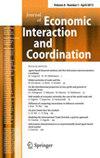Sustainability, resilience and innovation in industrial electronics: a case study of internal, supply chain and external complexity
IF 1
4区 经济学
Q3 ECONOMICS
Journal of Economic Interaction and Coordination
Pub Date : 2023-11-08
DOI:10.1007/s11403-023-00396-7
引用次数: 0
Abstract
Abstract The electrical and electronic equipment industry is key to climate and energy transitions, but its activities have a significant environmental footprint. Tangible improvements in the sustainability of this sector are difficult because of the layers of complexity that characterize this industry’s products, processes and supply chains. This article analyzes the different facets of complexity relevant to sustainability in the industrial electronics sector, by implementing an in-depth longitudinal case study of a leading Italian business-to-business multinational company. We identify three core dimensions of complexity management that are pivotal for corporate sustainability: internal complexity , supply chain complexity and external complexity . We find that handling sustainability in complex production systems with multitier and multiproduct value chains presents organizational and managerial challenges but also offers new competitive opportunities for resilience and innovation. Once the appropriate metrics, know-how and information flows are established, our results highlight the transferability of sustainable innovations in these complex environments.

工业电子的可持续性、弹性和创新:内部、供应链和外部复杂性的案例研究
电气和电子设备行业是气候和能源转型的关键,但其活动具有显著的环境足迹。由于该行业产品、流程和供应链的复杂性,该行业的可持续性很难得到切实改善。本文通过对一家领先的意大利企业对企业跨国公司进行深入的纵向案例研究,分析了与工业电子部门可持续性相关的复杂性的不同方面。我们确定了复杂性管理的三个核心维度,它们对企业的可持续性至关重要:内部复杂性、供应链复杂性和外部复杂性。我们发现,在具有多层和多产品价值链的复杂生产系统中处理可持续性提出了组织和管理挑战,但也为弹性和创新提供了新的竞争机会。一旦建立了适当的指标、技术诀窍和信息流,我们的研究结果强调了可持续创新在这些复杂环境中的可转移性。
本文章由计算机程序翻译,如有差异,请以英文原文为准。
求助全文
约1分钟内获得全文
求助全文
来源期刊
CiteScore
2.20
自引率
18.20%
发文量
33
期刊介绍:
Journal of Economic Interaction and Coordination addresses the vibrant and interdisciplinary field of agent-based approaches to economics and social sciences.
It focuses on simulating and synthesizing emergent phenomena and collective behavior in order to understand economic and social systems. Relevant topics include, but are not limited to, the following: markets as complex adaptive systems, multi-agents in economics, artificial markets with heterogeneous agents, financial markets with heterogeneous agents, theory and simulation of agent-based models, adaptive agents with artificial intelligence, interacting particle systems in economics, social and complex networks, econophysics, non-linear economic dynamics, evolutionary games, market mechanisms in distributed computing systems, experimental economics, collective decisions.
Contributions are mostly from economics, physics, computer science and related fields and are typically based on sound theoretical models and supported by experimental validation. Survey papers are also welcome.
Journal of Economic Interaction and Coordination is the official journal of the Association of Economic Science with Heterogeneous Interacting Agents.
Officially cited as: J Econ Interact Coord

 求助内容:
求助内容: 应助结果提醒方式:
应助结果提醒方式:


